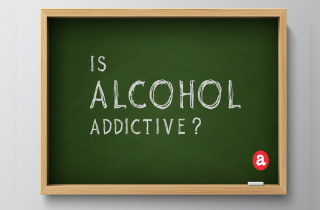Yes, alcohol can be addictive.
In fact, how alcohol works is based on brain and central nervous system actions. However, several factors play into alcohol addiction. There are genetic, environmental, and social factors that contribute to the potential of any chemical addiction. Alcohol is especially addictive because it is a socially acceptable drug with is abused often with little opposition in social settings. Alcohol is also considered a multi-generational drug of choice.
But what makes alcohol so addictive? How do you know that you’ve become addicted to alcohol or not? How to help an alcoholic get help? We review these questions here and invite your questions about the addictive potential of alcohol at the end.
What is alcohol used for?
Purer forms of alcohol may actually be used in survival kits to treat wounds and distance the body from feeling pain. This can be helping for roadside medic or in times in which there are no doctors and medical help around. Because of its combustible nature people have been tinkering with its potential to be a fuel.
Alcohol comes in a variety of forms with different levels of alcohol content or potency. Alcohol is not a substance prescribed by doctors though some recent studies have recommended that drinking one glass of red wine helps aid in digestion and provide health benefits. But this is not the primary function of alcohol.
Alcohol is mainly used for recreational purposes. Alcohol is considered a social lubricant and widely available in a variety of social engagements. People use alcohol because of its ability to alter brain chemistry and lower inhibitions. Alcohol is also used to feel pleasure and escape the stress of life. Many hobbies and businesses exist for the use and manufacturing of alcohol. While alcohol can help improve your mood, it also can cause aggression and severe depression.
What is alcohol made of?
Alcohol is classified as a depressant. Alcoholic beverages contain ethanol, which is produced through a process of fermentation. Fermentation is the process in which wheat breaks down sugars into alcohol and carbon dioxide. Along with the fermentation, ingredients for making alcohol are as variant as the beverages on the shelves. For example, potatoes are the main ingredient in vodka. Wine is made from different kinds fruits, the most common element being grapes. Beer is made from wheat and hops.
How addictive is alcohol?
Alcohol stimulates the pleasure reward system in the brain. This experience of pleasure reinforces the drive to continually use alcohol to avoid discomfort or the after effects of depression alcohol can cause. Furthermore, alcohol has been classified as a schedule II substance by the Controlled Substances Act, meaning that it has a high potential to be abused and drinking alcohol over time can lead to addiction. It also means that alcohol is regulated and if you abuse alcohol or drive after you drink, you may suffer severe criminal consequences.
Because alcohol is used across generations, scientists have been able to study its effects on the human body with more success than other drugs. Researchers are finding that there is a hereditary component to alcohol addiction. That is, some people are more predisposed to abuse alcohol for its pleasant effects and/or start an unhealthy relationship to alcohol. However, the length of alcohol withdrawal time varies by person and depends on the amount you drink and for how long.
Alcohol dependence vs. addiction
While related, alcohol dependence is different than alcohol addiction, also known as alcoholism. Dependence is when your body needs alcohol in order to regulate to proper chemistry on the brain. Addiction is when you can’t live without alcohol in your life as a psychological coping mechanism.
There are several potential ways of getting addicted to alcohol. In general, however, addiction effects each person or family differently. For some, avoiding addiction is really easy because they are born with a small likelihood of abuse. But others may have to be more careful. Social or weekend drinking can lead to abusing alcohol outside social occasions. Past family histories of alcoholism may also influence younger generations to drink. Regardless of its causes, there are a few ways that you can recognize an alcohol addiction.
Signs of alcohol addiction
In general, if you are using alcohol all the time in order to self-medicate or avoid symptoms of withdrawal, you may be addicted to alcohol. Other signs that may point to alcohol addiction include:
- alcohol use even within the presence of negative consequences
- can’t stop with just one drink
- impaired life because of the effects of alcohol
- needing alcohol to de-stress all the time
- weekend binges
Alcohol addiction potential questions
Do you still have questions about the addictive potential of alcohol? Please leave your questions, comments or feedback here. We are happy to help answer your questions personally and promptly. And if we do not know the answer to your particular alcohol question, we will refer you to someone who does.









Related Posts